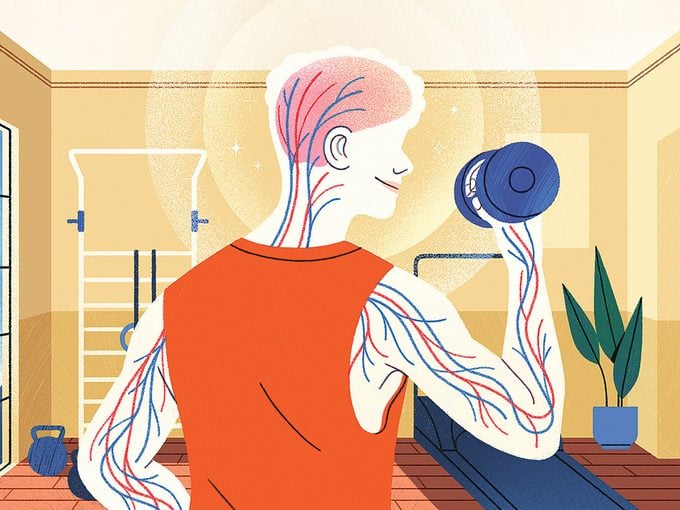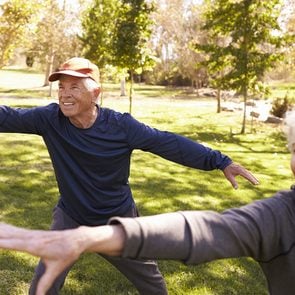It’s True: Runner’s High Benefits Both Mind and Body

Regular exercise releases "happy hormones" into the bloodstream, which may help alleviate depression
I’ve jogged through postpartum depression (twice), relied on Pilates classes to help me stretch during stressful times and I often go for a walk to shake off a bad day. So it’s no surprise to me that there’s a link between exercise and mental health. But scientists have now made it official: Research has pinpointed a direct connection between movement and mood.
Each time you work up a sweat, your body releases feel-good neurotransmitters, or “happy hormones,” including endorphins, dopamine and endocannabinoids, the latter being responsible for the so-called runner’s high. Now researchers are also pointing to myokines—which experts have dubbed “hope molecules”—as an important contributor to the mental health benefits of exercise.
When our muscles contract, chains of amino acids called myokines are released into the bloodstream and dispersed throughout the body, where they facilitate communication between your muscles and your organs. Researchers are particularly interested in the effect of myokines on the brain, called muscle-brain crosstalk, which is believed to increase resilience to stress, reduce symptoms of trauma and anxiety and have a direct effect on depression. A 2021 review published in Neuropharmacology established evidence that myokines help boost brain function, such as improving mental processes, memory and mood.
“Myokines reduce systemic inflammation, which is especially beneficial for people with drug-resistant depression whose low mood is linked to high levels of inflammation,” explains Dr. Jennifer Heisz, an expert in brain health and associate professor in the department of kinesiology at McMaster University in Hamilton.
There’s also a growing body of research proving that exercise helps build key connections between the networks within the brain, too, improving overall cognitive performance. Studies have shown that physical activity stimulates creativity, sharpens judgment skills and improves mental energy.
It can also help slow age-related cognitive decline, possibly even stalling the onset of conditions like Alzheimer’s disease. A new study published in the Journal for Alzheimer’s Disease Reports found that walking regularly (30 minutes a day four times a week) was enough to measurably improve memory, even in people who have already been diagnosed with mild cognitive impairment.
A recent study published in the British Journal of Sports Medicine showed that treatment for depression can be one and a half times more effective when physical activity is added to the usual care. Participants in the study found benefits after 12 weeks of exercising for 30 to 60 minutes per day.

“While exercise is not a substitute for professional mental health treatment, physical activity can complement and enhance the effects of the treatment,” says lead researcher Ben Singh, a research fellow at the University of South Australia.
Regular exercise can also boost self-esteem and decrease feelings of isolation and loneliness, if you’re working out in a group setting, says Singh.
Whether you’re cycling, swimming, walking around your neighbourhood or hitting up a hot-yoga studio, getting sweaty is good for your body and mind. But how much activity is enough to maintain brain health? Experts suggest that you aim for a minimum of 10 to 30 minutes, three to five days each week.
“When it comes to aerobic exercises for reducing depression, the research suggests that it’s less about how intense the exercise is and more about duration,” says Heisz.
Just 10 minutes of light movement, like gentle laps in the pool or walking your dog, are enough to boost your mood, and the effects increase for every 10 extra minutes that you move, for up to an hour. Exercising beyond 60 minutes didn’t provide extra mental health benefits, according to Singh’s study.
Attending a Pilates class and lifting weights also count toward your daily exercise goals (and this strength training is essential for strong bones), but for an added brain boost, you’ll need to take it up a notch. Research shows that increasing the intensity of your resistance workout by just 10 percent will yield a greater antidepressant effect.
“It is amazing to consider how moving our bodies can heal our minds,” says Heisz. To get the biggest overall health boost, the key is to zero in on sports and activities you enjoy, so you’ll keep going back to them.
Read about the 15 best workouts for people who hate exercise.






